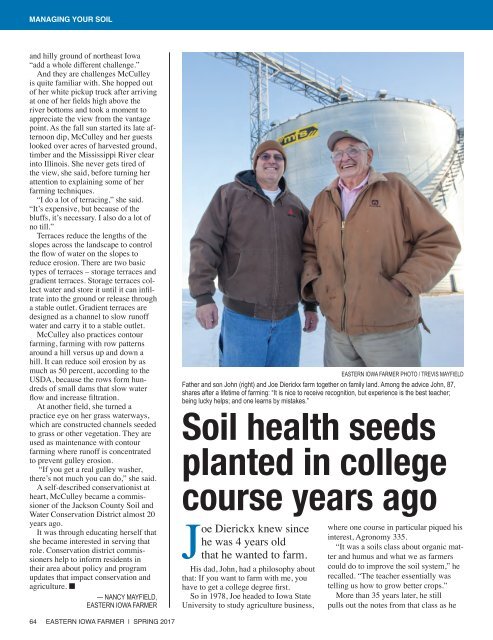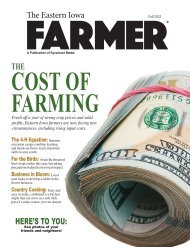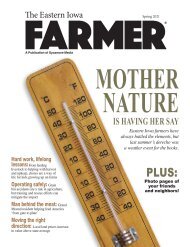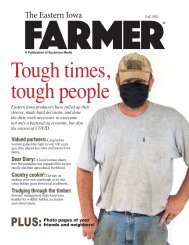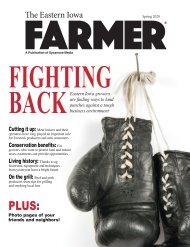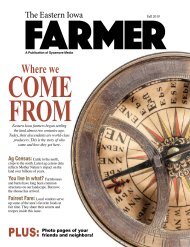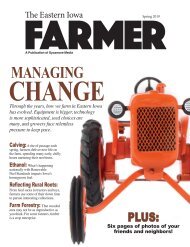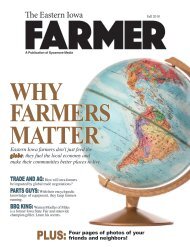Create successful ePaper yourself
Turn your PDF publications into a flip-book with our unique Google optimized e-Paper software.
managing your soil<br />
and hilly ground of northeast <strong>Iowa</strong><br />
“add a whole different challenge.”<br />
And they are challenges McCulley<br />
is quite familiar with. She hopped out<br />
of her white pickup truck after arriving<br />
at one of her fields high above the<br />
river bottoms and took a moment to<br />
appreciate the view from the vantage<br />
point. As the fall sun started its late afternoon<br />
dip, McCulley and her guests<br />
looked over acres of harvested ground,<br />
timber and the Mississippi River clear<br />
into Illinois. She never gets tired of<br />
the view, she said, before turning her<br />
attention to explaining some of her<br />
farming techniques.<br />
“I do a lot of terracing,” she said.<br />
“It’s expensive, but because of the<br />
bluffs, it’s necessary. I also do a lot of<br />
no till.”<br />
Terraces reduce the lengths of the<br />
slopes across the landscape to control<br />
the flow of water on the slopes to<br />
reduce erosion. There are two basic<br />
types of terraces – storage terraces and<br />
gradient terraces. Storage terraces collect<br />
water and store it until it can infiltrate<br />
into the ground or release through<br />
a stable outlet. Gradient terraces are<br />
designed as a channel to slow runoff<br />
water and carry it to a stable outlet.<br />
McCulley also practices contour<br />
farming, farming with row patterns<br />
around a hill versus up and down a<br />
hill. It can reduce soil erosion by as<br />
much as 50 percent, according to the<br />
USDA, because the rows form hundreds<br />
of small dams that slow water<br />
flow and increase filtration.<br />
At another field, she turned a<br />
practice eye on her grass waterways,<br />
which are constructed channels seeded<br />
to grass or other vegetation. They are<br />
used as maintenance with contour<br />
farming where runoff is concentrated<br />
to prevent gulley erosion.<br />
“If you get a real gulley washer,<br />
there’s not much you can do,” she said.<br />
A self-described conservationist at<br />
heart, McCulley became a commissioner<br />
of the Jackson County Soil and<br />
Water Conservation District almost 20<br />
years ago.<br />
It was through educating herself that<br />
she became interested in serving that<br />
role. Conservation district commissioners<br />
help to inform residents in<br />
their area about policy and program<br />
updates that impact conservation and<br />
agriculture. n<br />
— Nancy mayfield,<br />
eastern iowa farmer<br />
Joe Dierickx knew since<br />
he was 4 years old<br />
that he wanted to farm.<br />
His dad, John, had a philosophy about<br />
that: If you want to farm with me, you<br />
have to get a college degree first.<br />
So in 1978, Joe headed to <strong>Iowa</strong> State<br />
University to study agriculture business,<br />
eastern iowa farmer photo / trevis mayfield<br />
Father and son John (right) and Joe Dierickx farm together on family land. Among the advice John, 87,<br />
shares after a lifetime of farming: “It is nice to receive recognition, but experience is the best teacher;<br />
being lucky helps; and one learns by mistakes.”<br />
Soil health seeds<br />
planted in college<br />
course years ago<br />
where one course in particular piqued his<br />
interest, Agronomy 335.<br />
“It was a soils class about organic matter<br />
and humus and what we as farmers<br />
could do to improve the soil system,” he<br />
recalled. “The teacher essentially was<br />
telling us how to grow better crops.”<br />
More than 35 years later, he still<br />
pulls out the notes from that class as he<br />
64 <strong>Eastern</strong> <strong>Iowa</strong> <strong>Farmer</strong> | spring <strong>2017</strong>


